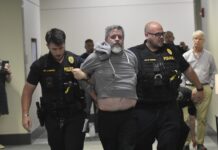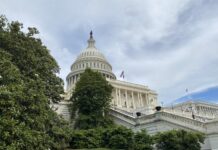
WASHINGTON (GA Recorder) — More than a dozen members of Congress were arrested Tuesday alongside abortion rights activists after they sat down and blocked an intersection between the U.S. Capitol building and the Supreme Court to protest conservative justices’ decision to overturn Roe v. Wade.
The act of civil disobedience came as backers of abortion rights urge more bold action from President Joe Biden to protect abortion access and Republican-led states ban or severely limit abortion services.
The 17 members of the U.S. House of Representatives and abortion rights advocates began walking together from the steps of the Capitol toward the Supreme Court building around 1 p.m.
Fifteen minutes later, they sat down in an intersection in front of the fenced-off Supreme Court building as a U.S. Capitol Police officer warned they were involved in illegal demonstration activity and would be arrested if they didn’t move.
A few minutes later, as lawmakers and protesters chanted in support of abortion rights, U.S. Capitol Police officers began leading them away to a shaded, grassy area nearby where they would be charged with crowding, obstructing or incommoding under District of Columbia law and told they needed to pay a $50 fine.
Thirty-five people were charged, including 17 Members of Congress, according to the Capitol Police. Those arrested included Democratic Reps. Alma Adams of North Carolina, Madeleine Dean of Pennsylvania, Cori Bush of Missouri, Rashida Tlaib and Andy Levin of Michigan, Bonnie Watson Coleman of New Jersey and Ilhan Omar of Minnesota.
‘A signal to my daughters and granddaughters’
Dean told States Newsroom in a brief interview after being detained by police for about an hour that she joined the demonstration to “provide civil disobedience to stand up against unjust laws.”
“I wanted to send a signal to my daughters and granddaughters. I will stand up for their rights,” she said.
Dean said she expected Democrats will keep holding events and debating legislation that protects reproductive rights, including abortion access. However, she wasn’t sure if members would hold other demonstrations that could lead to arrest.
“You’ll see us taking legislative action or talking to the media, doing everything we possibly can to say the stripping of rights of half of our citizens, putting us in a second-class position, that will not stand,” Dean said.
Bush told reporters while detained by police that she decided to attend the protest to continue the advocacy she’s been part of for years.
“I co-organized and co-led an occupation of Sen. Roy Blunt’s office — and he talks about it — back years ago during the Brett Kavanaugh hearings, because we saw this coming,” Bush said, referring to the Republican senator from Missouri and the Supreme Court justice. “We knew that if he was able to be confirmed, and some other things took place, that this could happen.”
Bush said that as a member of Congress now, she now has a voice and power in a different way and wants to use that to defend reproductive rights, including access to safe abortions.
“I have to do everything I can to be able to raise this issue and to make sure people know we will not stop fighting,” Bush said. “And this is not just for us now. This is for our legacy. This is our children’s children.”
Levin said while detained and a band played upbeat music in the background that the U.S. Senate needs to eliminate the 60-vote legislative filibuster that’s stopped abortion bills from advancing.
“The filibuster is a vestige of Jim Crow,” he said. “Our founding fathers didn’t want it. It’s just a simple Senate rule that a majority of senators should get rid of.”
Just because the U.S. Supreme Court ruled that abortion isn’t a constitutional right doesn’t mean Congress can’t make it a statutory right, Levin said.
Votes in House
The U.S. House voted last week to approve legislation that would once again make abortion legal nationwide and a bill that would ensure patients who need to travel out of state for abortions can do so without interference.
Neither measure is expected to make it past the Senate’s 60-vote legislative filibuster.
The House is set to vote later this week on a bill that would ensure access to contraception, amid concerns from activists that the Supreme Court may undo other cases, including the ones that guarantee people the ability to decide how to use contraception.
Associate Justice Clarence Thomas wrote in his opinion overturning the constitutional right to abortion that he believes the Supreme Court should revisit the contraception case as well as the case that legalized same-sex marriage and the case that barred the government from interfering in consensual adult private sexual relationships.







